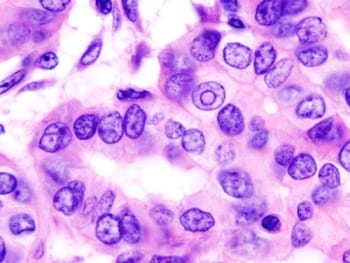
Each year in the United States, about five out of every 100,000 men and 14 out of every 100,000 women develop thyroid cancer. The number of diagnosed cases has been increasing over the past few decades, but the number of deaths due to the disease — about 1,500 per year — has remained the same. Experts have suggested that this means the number of people affected by the disease is not actually changing, just the number found by physicians.
Studies have shown that genetics plays a larger role in thyroid cancer compared to other malignancies, but not much is known about the specific genes or variations that might be involved. Now, a study being published online today by the journal Nature Genetics has identified two variations that together can increase the risk of thyroid cancer more than five-fold.
In a combined analysis that compared more than 960 subjects with thyroid cancer from Iceland, Spain and the United States to more than 38,000 controls, Julius Gudmundsson and colleagues found that each A at SNP rs965513 increased the odds of the disease by 1.75 times. Each T* at rs944289 increased the odds of thyroid cancer by 1.37 times.
According to the authors, about 3.7% of the population with European ancestry has the riskier version at both copies of both SNPs. These people are estimated to have 5.7 times greater odds of developing thyroid cancer compared to people who carry no risky versions of either SNP.
The riskier versions of both SNPs were also associated with decreased blood levels of thyroid stimulating hormone, a key regulator of thyroid function that is secreted by the pituitary gland. The A version of rs965513 was also associated with changes in the blood levels, of T3 and T4, two hormones made by the thyroid itself.
“Compared to the common susceptibility variants recently discovered for complex diseases, the relative risks associated with the variants reported here are quite high….Furthermore, we have demonstrated that these variants influence crucial players in the thyroid hormonal pathway. These variants are therefore likely to be among the most important determinants of genetic susceptibility to thyroid cancer,” the authors conclude.
* The original post contained an error, identifying the C version of rs944289 as the version that is associated with increased odds of thyroid cancer. In fact, it is the T version of this SNP that increases odds by 1.37 times. We apologize for this mistake, and thank the Blog reader who brought it to our attention.



